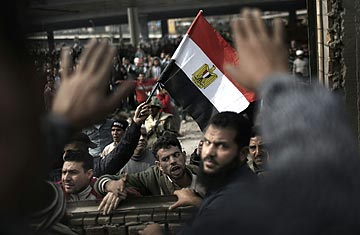
Anti-government demonstrators gather in Tahrir Square, in Cairo, on Feb. 3, 2011
(2 of 2)
"You're not safe here," Fatima told me before scurrying away, convinced by my Lebanese Arabic that I was not a local secret police officer. "Please leave for your own good."
I walked toward an Egyptian teahouse along a side street. Half a dozen young men sat on green plastic chairs smoking water pipes. The scent of apple tobacco filled the air. Mohammad, 19, an engineering student, sipped sweet tea out of a glass. "Every word these days can be dangerous," he said. "People are afraid. They don't believe Mubarak will leave. It's a very difficult situation, and I don't know what the solution is."
Three of his friends from high school listened intently, but none dared to speak. "I'm not with anyone," Mohammad said, "but we're entering dangerous days." "Where is your ID?" one of his friends suddenly asked me. "We want to see it. Where are you really from? How do we know that you are a journalist?"
"Please, we don't want to talk politics here," a mustachioed waiter, carrying several glasses of tea on an aluminum tray, told the young men. "We don't want any trouble." He pulled me aside apologetically and said, "I'm sorry, but it's hard for us to speak at the moment."
I made my way back out into the neighborhood, past a church. I met a middle-aged man, Youssef, who relaxed once he heard my non-Egyptian Arabic accent. "We're very scared. We don't know what will happen," he said. "As a Christian, I feel caught in the middle. Either way, we lose, because we have no political power, and now the Muslim Brotherhood is gaining strength. These are not good days for us."
Young thuggish-looking men at makeshift checkpoints stopped passersby in vehicles, asking them for identification. At several of these checkpoints, they were joined and directed by uniformed police officers. I got into a cab to retrun to my hotel but was soon stopped. Half a dozen screaming men wanted to see my identification. I gave them my Lebanese ID. It wasn't enough. A police officer demanded my passport, an Australian document that he leafed through carefully, before interrogating me for 15 minutes.
There's an arrogance, a swagger, exhibited by these pro-Mubarak neighborhood groups that didn't exist a few days ago. "We don't want you in Egypt," the officer said. His voice was full of menace. He stared at the red welt above my left eye, a chemical burn due to tear gas. "I hope that an Egyptian did that to you," he said. "It's a shame it isn't bigger. Now leave this place and our country. The only thing you need to know is that we are all with Mubarak. We don't want you here."
